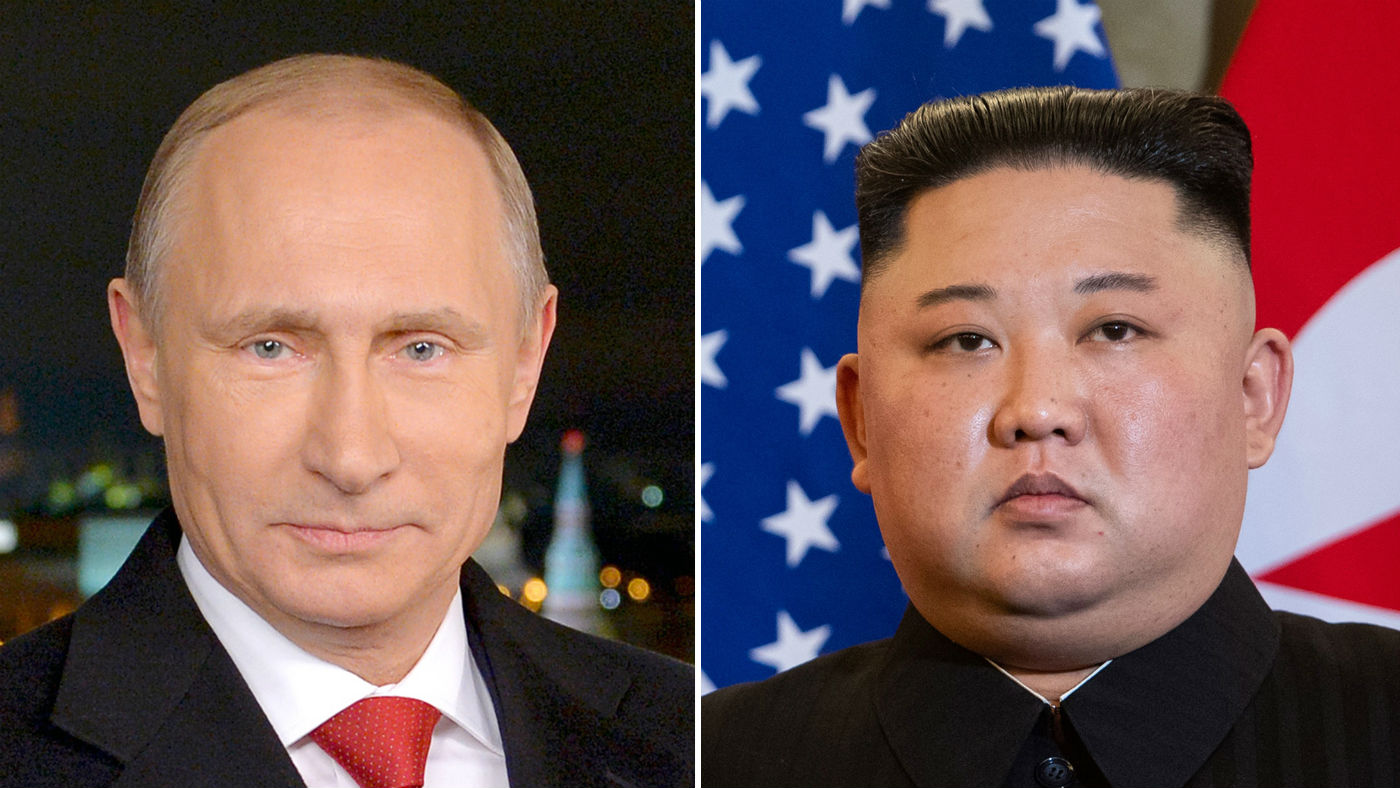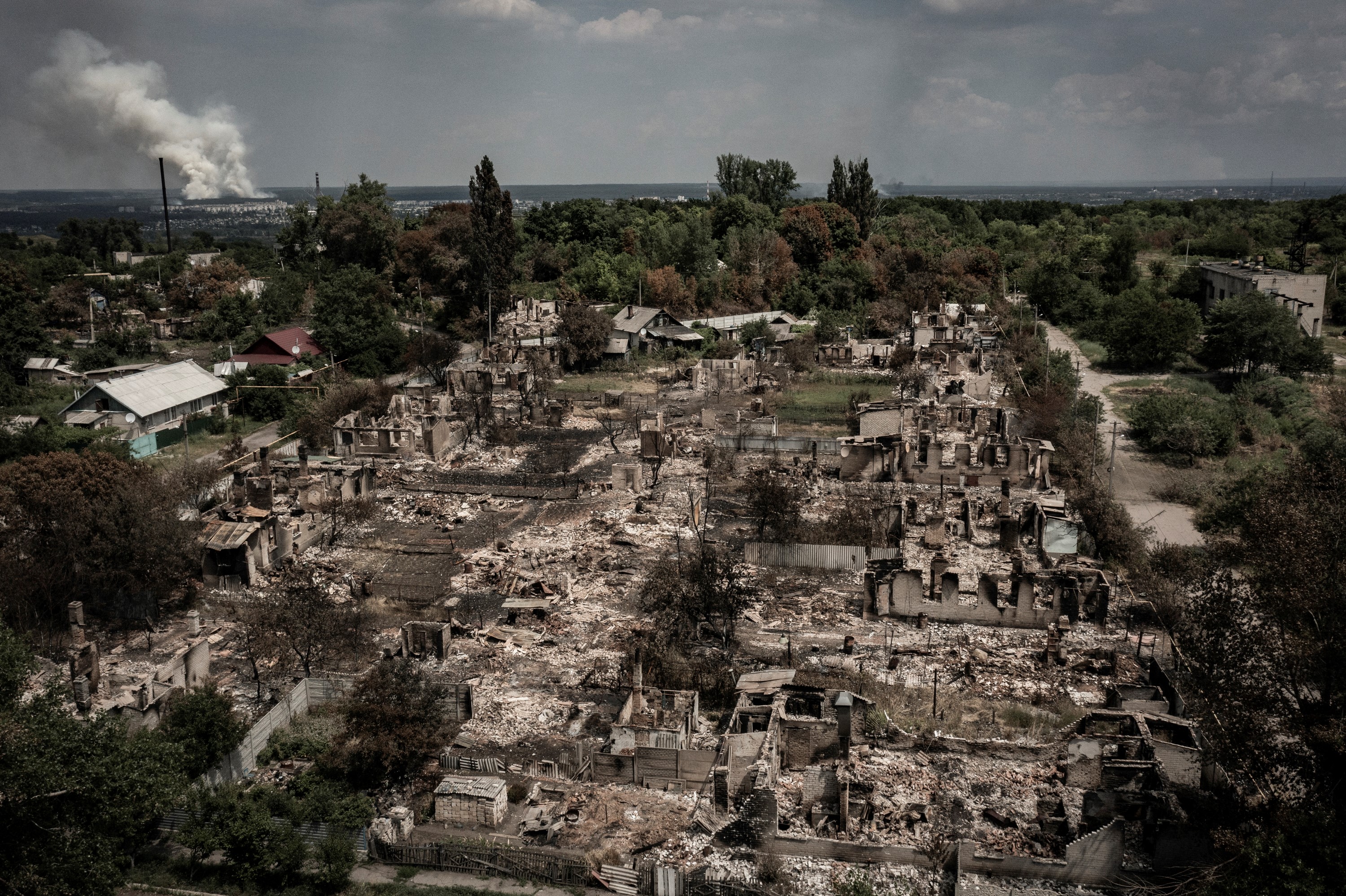Vladimir Putin meets Kim Jong Un: what they agreed
North Korean leader travelled by armoured train to the city of Vladivostok for nuclear talks

A free daily email with the biggest news stories of the day – and the best features from TheWeek.com
You are now subscribed
Your newsletter sign-up was successful
Vladimir Putin and Kim Jong Un have met for the first time, pledging to boost ties and find a diplomatic solution to the nuclear stand-off on the Korean Peninsula.
The North Korean leader travelled by armoured train to the eastern city of Vladivostok in Russia before meeting the president on a remote island off the coast on Thursday.
Kim said the two leaders had a “very meaningful one-on-one exchange of opinions on issues of mutual interest and current issues”, while Putin said he was “satisfied with the results” of the talks, which he said spanned denuclearisation, sanctions and the United States.
The Week
Escape your echo chamber. Get the facts behind the news, plus analysis from multiple perspectives.

Sign up for The Week's Free Newsletters
From our morning news briefing to a weekly Good News Newsletter, get the best of The Week delivered directly to your inbox.
From our morning news briefing to a weekly Good News Newsletter, get the best of The Week delivered directly to your inbox.
CBS News says Kim travelled to Russia with “a long wish list and a strong desire to notch a win after the failure of his second summit with President Donald Trump”.
The biggest takeaway appears to be North Korea’s willingness to abandon its nuclear programme providing it receives international security guarantees backed by multiple countries in return.
According to the Russian presidential spokesman, Dmitry Peskov, the Kremlin believes the six-party talks on North Korea, which began in 2003 but are currently stalled, are the only efficient way of addressing the issue of nuclear weapons on the peninsula.
The Independent reports that “the Kremlin has long sought a summit with the North Korean leader, with analysts saying Putin is ‘desperate to be considered a person of significance on the Korean peninsula, and to use that in diplomatic games with Washington’.”
A free daily email with the biggest news stories of the day – and the best features from TheWeek.com
In addition, “Moscow is interested in gaining broader access to North Korea’s mineral resources, including rare metals”, Sky News reports.
The two nations were staunch allies during the Cold War, but “since the collapse of the Iron Curtain the relationship has suffered”, says the BBC.
“With weakened ideological ties there was no reason for special treatment and support,” the broadcaster reports. “And as a regular trading partner, North Korea was not very attractive to Russia, as it was unable to pay international market prices.”
But Russia’s increasing estrangement with the West has led to revived links with Pyongyang, “based on the old logic that my enemy’s enemy is my friend,” says Professor Andrei Lankov of Seoul’s Kookmin University.
“While military cooperation between the states was stopped by United Nations sanctions, Moscow provided grain and humanitarian aid to the North,” says Deutsche Welle. “Meanwhile, tens of thousands of North Korean migrant laborers have worked in Russia’s underpopulated Far East.”
Kim is hoping Russian investment will help modernise the country’s Soviet-built industrial plants and railways and ease the economic strain caused by Western sanctions.
But “while the meeting is an important gesture for both sides, analysts do not expect Russia to invest heavily in cash-strapped North Korea”, says The Guardian’s Andrew Roth.
For one thing, Putin “has a lot on his plate and good reason to be cautious about making any big new commitments”, says CBS.
He particularly wants to avoid any move that might strain relations with China. Immediately after seeing Kim, Putin is due fly to Beijing for a major international meeting on China’s “Belt and Road” initiative, which could be hugely lucrative for Russia.
-
 Film reviews: ‘Send Help’ and ‘Private Life’
Film reviews: ‘Send Help’ and ‘Private Life’Feature An office doormat is stranded alone with her awful boss and a frazzled therapist turns amateur murder investigator
-
 Movies to watch in February
Movies to watch in Februarythe week recommends Time travelers, multiverse hoppers and an Iraqi parable highlight this month’s offerings during the depths of winter
-
 ICE’s facial scanning is the tip of the surveillance iceberg
ICE’s facial scanning is the tip of the surveillance icebergIN THE SPOTLIGHT Federal troops are increasingly turning to high-tech tracking tools that push the boundaries of personal privacy
-
 Israel retrieves final hostage’s body from Gaza
Israel retrieves final hostage’s body from GazaSpeed Read The 24-year-old police officer was killed during the initial Hamas attack
-
 China’s Xi targets top general in growing purge
China’s Xi targets top general in growing purgeSpeed Read Zhang Youxia is being investigated over ‘grave violations’ of the law
-
 Ukraine, US and Russia: do rare trilateral talks mean peace is possible?
Ukraine, US and Russia: do rare trilateral talks mean peace is possible?Rush to meet signals potential agreement but scepticism of Russian motives remain
-
 Panama and Canada are negotiating over a crucial copper mine
Panama and Canada are negotiating over a crucial copper mineIn the Spotlight Panama is set to make a final decision on the mine this summer
-
 Why Greenland’s natural resources are nearly impossible to mine
Why Greenland’s natural resources are nearly impossible to mineThe Explainer The country’s natural landscape makes the task extremely difficult
-
 Iran cuts internet as protests escalate
Iran cuts internet as protests escalateSpeed Reada Government buildings across the country have been set on fire
-
 US nabs ‘shadow’ tanker claimed by Russia
US nabs ‘shadow’ tanker claimed by RussiaSpeed Read The ship was one of two vessels seized by the US military
-
 All roads to Ukraine-Russia peace run through the Donbas
All roads to Ukraine-Russia peace run through the DonbasIN THE SPOTLIGHT Volodymyr Zelenskyy is floating a major concession on one of the thorniest issues in the complex negotiations between Ukraine and Russia